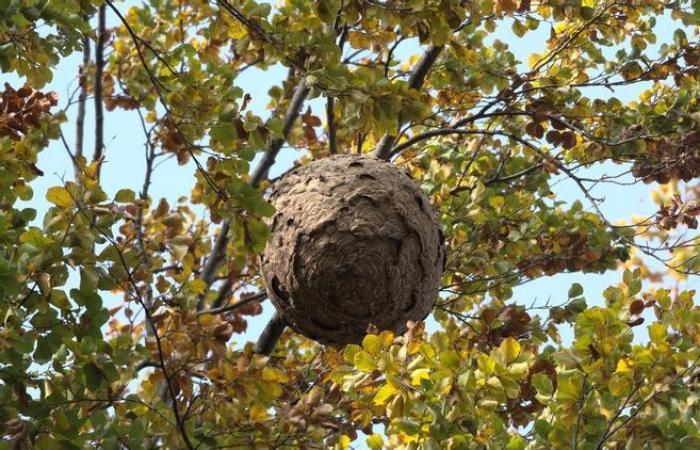He arrived in France almost 20 years ago. Since then, the Asian hornet has caused fear due to its proliferation and the damage it causes. Devastating for bee populations, it is also a danger for humans.
If the climate of Haute-Loire is not the most conducive to the proliferation of the Asian hornet, the department is not immune to the progression of this species reported for the first time in France 20 years ago. “We have been fighting it since its arrival, but it is very complicated because the queen makes nests in trees perched very high,” laments Michel Clément, president of the Haute-Loire Beekeeping Health Defense Group. The impacts of this insect are multiple.
For humans it can be dangerous, even outside of those who are allergic. People can be, for example, attacked while cutting a hedge by a population that is inside.
But this danger is not the most common, because this insect only stings if it feels attacked. “They are adapting more and more to the climate and making their nests high up, 10, 20 or 30 meters in the trees,” adds Jérémy Besson, manager of Stop Wasps and Hornets, specializing in the destruction of nests. Stings, unlike those of European hornets, may be less common. Because the latter can make nests in the trunks of trees or in the ground.
premium Water, energy, climate change… the eco-citizen collective of Brivadois reveals its short and medium term prospects
On the other hand, for this professional and former firefighter, it is imperative to destroy the nests once they are spotted. “A nest can have up to 500 queens. When they leave, each creates a new nest. Proliferation is extremely rapid. »And this phenomenon has a significant impact on nature. “The Asian hornet feeds on other insects and creates an imbalance for different species. This is a significant problem for bees. He attacks them. In numbers, it can decimate hives,” notes Michel Clément.
A cost of 100 to 200 €
This has worried beekeepers for many years because bee mortality is already significant due to global warming. Unfortunately, as the population does not necessarily feel disturbed by the presence of the Asian hornet, the destruction of nests is not widespread. And then, financially, “it costs around €100 to €200”. An observation shared by Raphaël Lancier, specialist in swarm destruction, based in Saint-Ilpize: “An intervention starts at €100 so people don’t necessarily have that amount to spend. The problem if they don’t do this is the proliferation of the species. » To avoid it, the two professionals want to warn individuals.
Do not use commercially available bombs. They are used for small wasp nests. For the Asian hornet, it is different, the nest is much thicker.
Before adding: “Attacking it with a bomb is not effective and it is dangerous for the user. » This can irritate the insects and lead to numerous bites. This is the reason why these specialists use suits whose thickness is much greater than those of beekeepers.
Nicolas Jacquet






